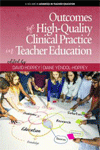
Outcomes of High-Quality Clinical Practice in Teacher Education
Edited by:
Diane Yendol-Hoppey, University of North Florida
David T. Hoppey, University of North Florida
A volume in the series: Advances in Teacher Education. Editor(s): Diane Yendol-Hoppey, University of North Florida. David T. Hoppey, University of North Florida. Jennifer L. Snow, Boise State University. Jennifer Jacobs, University of South Florida.
Published 2018
For decades teacher education researchers, organizations, and policy makers have called for improving teacher education by creating clinically based preparation programs (e.g. CAEP, 2013; Goodlad, 1990; Holmes, 1986, 1995; National Association for Professional Development Schools, 2008; National Council for the Accreditation of Teacher Educators, 2001, 2010; Zeichner, 1990).
According to the NCATE Blue Ribbon Report (2010), this approach requires extensive opportunities for prospective teachers to connect and apply what they learn from school and university based teacher educators. Similar to preparing medical professionals, clinical practice in teacher education requires the complex and time intensive work of supporting teacher candidate ability to link theory, research, and practice as well as on-going inquiry into best pedagogical practices. Therefore, clinically intensive programs expect prospective teachers to blend practitioner and academic knowledge throughout their programs as "they learn by doing" (NCATE, 2010, p.ii). However, most of the literature to date on clinical practice has been conceptual and often relies on describing program design. The purpose of this book is move past description to study and understand what teacher education programs are learning from research about innovative clinical models of teacher education.
Each book chapter highlights research about how programs are studying a variety of outcomes of clinical practice. After an introductory chapter that helps to define and situate clinical practice in teacher education, the book is organized into four sections: (1) Outcomes of New Roles, (2) Outcomes of New Practices, (3) Outcomes of New Coursework/Fieldwork Configurations, and (4) Outcomes of New Program Configurations. The book wraps up with a discussion that looks across the chapters to find common themes, share implications for teacher educators, and set the course for future research.
CONTENTS
Preface, David Hoppey and Diane Yendol-Hoppey. Dedication. Acknowledgments. Defining High Quality Clinical Practice in Teacher Education, Diane Yendol-Hoppey and David Hoppey. Section 1: Outcome of New Roles. Understanding Mentoring Practices in a Professional Development School Partnership: Collaborating with the Professional Development Associate, Kelly Mark and James F. Nolan. The Site Coordinator Role in a Clinically Rich Teacher Education Program, Jessica DeBiase, William Butler, Ruhi Khan, and Penelope A. Dyer. Section 2: Outcomes of New Practices. The Role of Preservice Teacher Coaching in Clinically Rich Teacher Education, Mary Kay Rodgers, Vicki Vescio, Jamey Burns and Lauren Gibbs. Creating Spaces for Becoming: Interrogating the Voices that Arise in Clinical Practice, Sharon B. Hayes and Johnna J. Bolyard. Curriculum- Based VAM Using Action Research: An Alternative to Traditional VAM in Clinically-Rich Teacher Education, Michael P. Brady and Katie M. Miller. Section 3: Outcomes of New Coursework-Fieldwork Integration. We Need to be Prepared! Teacher Candidates’ Third Learning Space with University English Language Learners, Yukari Takimoto Amos. Fostering a Civic Ethos: Teacher Candidates as Effective Citizens in an urban PDS, Special Education Context, Deborah S. Reed and Darcey J. Gray. Understanding Teacher Candidates’ Perspectives of Learning to Teach during an Innovative Summer Practicum, David Hoppey, David Allsopp, Michael Riley, Aimee Frier, and Stacy Hahn. Section 4: Outcomes of New Program Configurations. Restructuring Teacher Preparation with Culturally Relevant Principles: A Best Practice for Clinically Rich Teacher Preparation and 21st Century Learners, Janice Bell Underwood, Gail K. Dickinson, and Diana V. Cantu. Perceptions of Preparedness: Reflections of Deaf Education Program Graduates, Jennifer Renée Kilpatrick, Emily Headrick-Hall, and Kimberly A. Wolbers. Looking Across the Chapters: Reflections and Enduring Questions, Rebecca West Burns.
-
Paperback978-1-64113-375-3
Web price: $45.04 (Reg. 52.99)
-
Hardcover978-1-64113-376-0
Web price: $80.74 (Reg. 94.99)
- eBook978-1-64113-377-7

- EDU029000 - EDUCATION: TEACHING METHODS & MATERIALS: General
- EDU053000 - EDUCATION: Training & Certification
- EDU030000 - EDUCATION: Testing & Measurement
-
 (Re)Designing Programs:
A Vision for Equity-Centered, Clinically Based Teacher Preparation
(Re)Designing Programs:
A Vision for Equity-Centered, Clinically Based Teacher Preparation
-
 Collaboration, Narrative, and Inquiry That Honor the Complexity of Teacher Education
Collaboration, Narrative, and Inquiry That Honor the Complexity of Teacher Education
-
 Cultivating Democratic Literacy Through the Arts
Guiding Preservice Teachers Towards Innovative Learning Spaces in ELA Classrooms
Cultivating Democratic Literacy Through the Arts
Guiding Preservice Teachers Towards Innovative Learning Spaces in ELA Classrooms
-
 Exemplary Clinical Models of Teacher Education
Exemplary Clinical Models of Teacher Education
-
 Pathways Into Teacher Education
Profiles of Emerging Teacher Educator Development
Pathways Into Teacher Education
Profiles of Emerging Teacher Educator Development
-
 Preparing the Next Generation of Teacher Educators for Clinical Practice
Preparing the Next Generation of Teacher Educators for Clinical Practice
-
 Professional Learning Journeys of Teacher Educators
Professional Learning Journeys of Teacher Educators

